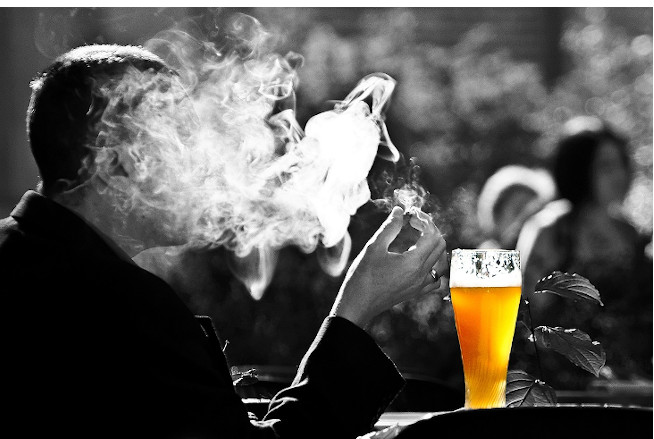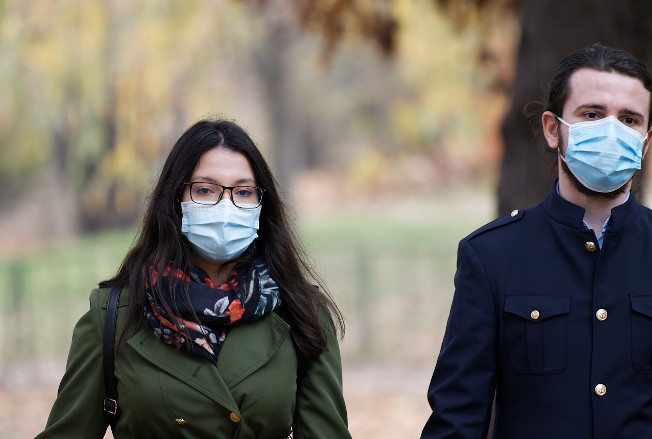I Am Not Alone; Aren’t I Somebody?

No one knows what I’m doing right now.
The hairs on my warm-blooded skin are vertical as the coldness from the sunset creates shivers up my spine. My eyes gaze above the horizon; and the beige buildings of the capital become watery and blurred.
As I sit alone staring into the history of Washington D.C., my mind creeps in with the feeling of wishing I was experiencing this with someone, frustrated by feeling as though I needed more to accompany my already grand experience.
My lips hit the burning yellow-and-white stick as tobacco enters my lungs. The burn stings, my eyes drip and then my mind feels the rush, the dopamine.
My mind starts to fish for any excuse to tell myself I could be having a better experience if I wasn’t alone. To share the experience with someone with whom I felt comfortable and vulnerable is what I thought I needed.
I frantically rip open the box and grab another cigarette to fix my mind, to get the ease I so crave. I roll, flicker, and light. Sparking the stick once again, the idea of sitting alone on this park bench isn’t so scary anymore.
The harsh, chemical sting can hurt, like the burn of feeling a lack of your desires, wants, and needs.

There are societal and emotional theories that being alone can only have negative effects on your well-being, yet sitting on that bench made me remember that it’s actually crucial for me to spend time alone to ponder -- be creative and learn more about myself.
It’s far from easy to always enjoy time to yourself. A study conducted by Julie Bowker, associate professor in the Department of Psychology at the University of Buffalo in New York, which examined social withdrawal, informs us about the idea of unsociability and how it's not necessarily a negative characteristic.
Within her study of 295 participants, their characters and desire to remove themselves from social interactions were studied to ultimately determine whether withdrawal from social interactions could or couldn't affect a person's productivity, creativity, or well-being.
The release about this study quotes Bowker:
“During adolescence, the idea that if you’re removing yourself too much from your peers, then you're missing out on positive interactions receiving social support, developing social skills and other benefits.”
Yet, she continues that this idea could stem from the reason why as a culture we’re so focused on the “don'ts” of withdrawing yourself from different scenarios -- e.g., FOMO - the fear of missing out.
As I look down at the smoke seeping into my eyes, the yellow stick has now burnt halfway. Still confused on how I fully feel being alone, I am not as confused and frustrated as when the cigarette first met with fire.

No longer mad that no one asks where I am or curious what I’m doing, I tap into the feeling of a new sense of freedom -- being able to go anywhere, do anything, and try anything -- without any outside influence -- gives me an opportunity for a better lesson because it's my raw desire, and my experience alone.
Being isolated in a place that is unfamiliar is a vulnerable spot to be. Feeling like you’re the fish in the bowl can be scary in places that you feel vulnerable. It’s not easy to be alone when you feel like you need to depend on others -- it actually feels debilitating for me.
We’re so accustomed to linking being alone with loneliness that continuing to avoid being alone or avoiding our own thoughts keeps us on the carousel of clammy hands, a tight chest or in other terms, anxiety.
The dependency is what scared me. Feeling tied down by ropes into feeling insecure, that I couldn’t depend on myself for my happiness and security, I turned to different outlets like alcohol, codependency, and drugs.
I’d be oblivious to the fact that not everyone has an opportunity to choose to be alone or not. It was harder for me to be in the discomfort of being alone when it wasn’t my decision.
Trapped in my house in 2020 during the pandemic with everyone else, a reality so shocking I felt like I was forced to feel alone, yet living with family -- this feeling still lingered. I would sit lifeless in my room as my mind rambled into traffic, feeling desperate to have something else other than to wallow in my own thoughts. I started to think of ways I can make being alone easier and more enjoyable.
I turned to new outlets that served me a great purpose. Under the hot, humid Houston air of 2020, I grew to explore where I could push the boundaries of my paint and sketch work, my writing, and the ability to allow my nervous system a second to breathe, and be comfortable feeling alone and to continue to enjoy my presence.
In my 20s, I’ve traveled by myself. Whether I was uncomfortable driving hours, planning a destination, or figuring out my itinerary, I trusted in my future self that I would be able to figure out the things I need to get where I want to be. Traveling alone has its clear dangers; however, the ‘soul-searching’ endeavors I experienced when I allowed myself to ponder makes me more in sync with this part of my character today.

The most beautiful place for serenity, tranquility, and alone time for me is when I can hear the hushing of the oak trees, the birds communicating, and the sun warming my complexion. Being in nature gives me the recharge I need to continue marching through my day-to-day life.
Prioritizing time alone for yourself or creating space for solitude can help you feel calmer to better equip yourself in outside situations. Thuy-vy Nguyen from the University of Durham examined solitude and the effects it can have on people and their mental, social, and physical life.
According to the New York Times, Nguyen has said, “Enjoying the benefits of time alone isn’t a question of being an introvert or extrovert. More consistently, people who value solitude and who tend not to ignore their own desires in the pursuit of pleasing others will find time alone more enjoyable.”
As my lips taste the burnt butt of the cigarette, I know I feel the moments of angst when I want affection and love and when I don’t -- being alone is easier. The idea of loneliness, the desire to feel the need for solitude helps me be more grateful for the experiences I’ve given myself throughout my moments of enjoying my own presence.
I was initially so angry that I didn’t have what I thought I needed or what I thought I didn’t have. I sulked, huffed, and just wanted somebody with whom to share my adventurous experiences -- yet deep down, I know: I’m not alone, because aren’t I somebody?
Author Bio:
Walker Hardy is a contributing writer at Highbrow Magazine.
For Highbrow Magazine
Image Sources:
--Pixabay (Creative Commons)
--4924546 (Pixabay, Creative Commons)
--Surprising Shots (Pixabay, Creative Commons)
--Pixabay (Creative Commons)































































































































































































































































































































